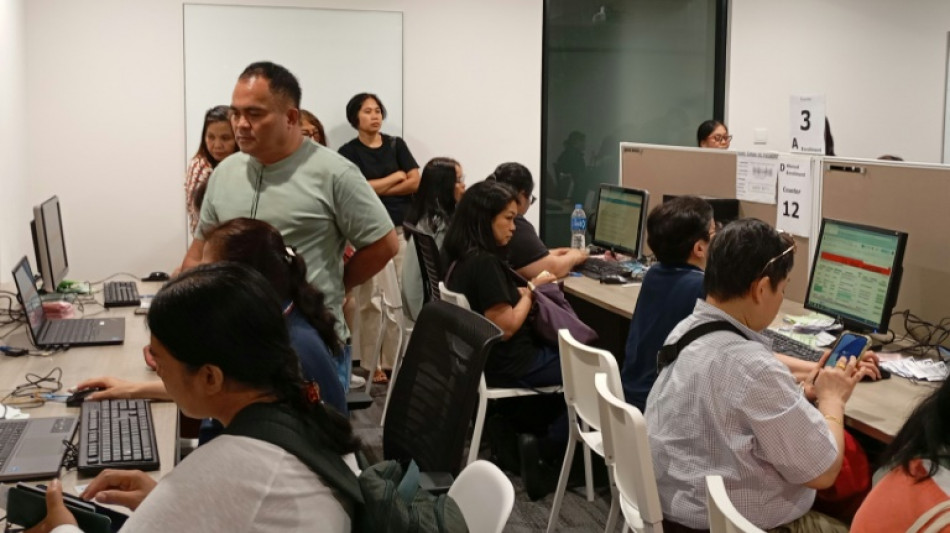
-
 Scandic Trust Group strengthens sales network with First Idea Consultant
Scandic Trust Group strengthens sales network with First Idea Consultant
-
Central Nigerian town rebuilds religious trust in shadow of Trump's threat

-
 Inside Germany's rare earth treasure chest
Inside Germany's rare earth treasure chest
-
Former jihadist Syrian leader makes unprecedented White House visit

-
 Kagiyama takes NHK lead in Japan to kick-start Olympic season
Kagiyama takes NHK lead in Japan to kick-start Olympic season
-
Ikea profits drop on lower prices, tariff costs

-
 European, Asian stocks decline after Wall Street slide
European, Asian stocks decline after Wall Street slide
-
German FA extends with president Neuendorf until 2029

-
 No end to Sudan fighting despite RSF paramilitaries backing truce plan
No end to Sudan fighting despite RSF paramilitaries backing truce plan
-
US officials, NGOs cry foul as Washington snubs UN rights review

-
 Injured teen medal hope Tabanelli risks missing home Winter Olympics
Injured teen medal hope Tabanelli risks missing home Winter Olympics
-
Bellingham, Foden recalled to England squad for World Cup qualifiers

-
 Tanzania rights group condemns 'reprisal killings' of civilians
Tanzania rights group condemns 'reprisal killings' of civilians
-
Slot urges patience as Isak returns to training with Liverpool

-
 Rees-Zammit set for Wales return with bench role against Argentina
Rees-Zammit set for Wales return with bench role against Argentina
-
China's new aircraft carrier enters service in key move to modernise fleet

-
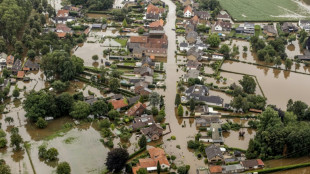 Operation Cloudburst: Dutch train for 'water bomb' floods
Operation Cloudburst: Dutch train for 'water bomb' floods
-
Leaders turn up the heat on fossil fuels at Amazon climate summit

-
 US travel woes mount as govt shutdown prompts flight cuts
US travel woes mount as govt shutdown prompts flight cuts
-
North Korea fires unidentified ballistic missile: Seoul military
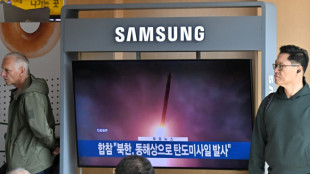
-
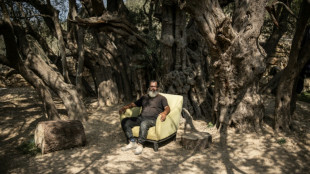 West Bank's ancient olive tree a 'symbol of Palestinian endurance'
West Bank's ancient olive tree a 'symbol of Palestinian endurance'
-
Global tech tensions overshadow Web Summit's AI and robots

-
 Green shines as Suns thump Clippers 115-102
Green shines as Suns thump Clippers 115-102
-
Japan to screen #MeToo film months after Oscar nomination

-
 Erasmus relishing 'brutal' France re-match on Paris return
Erasmus relishing 'brutal' France re-match on Paris return
-
Rejuvenated Vlahovic taking the reins for Juve ahead of Turin derby

-
 'Well-oiled' Leipzig humming along in Bayern's slipstream
'Well-oiled' Leipzig humming along in Bayern's slipstream
-
Bangladesh cricket probes sexual harassment claims

-
 NFL-best Broncos edge Raiders to win seventh in a row
NFL-best Broncos edge Raiders to win seventh in a row
-
Deadly Typhoon Kalmaegi ravages Vietnam, Philippines
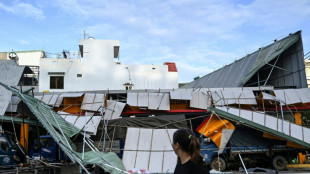
-
 Three killed in new US strike on alleged drug boat, toll at 70
Three killed in new US strike on alleged drug boat, toll at 70
-
Chinese microdrama creators turn to AI despite job loss concerns

-
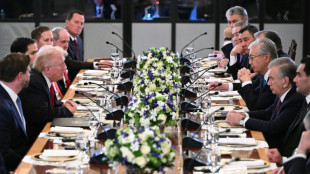 Trump hails Central Asia's 'unbelievable potential' at summit
Trump hails Central Asia's 'unbelievable potential' at summit
-
Kolya, the Ukrainian teen preparing for frontline battle

-
 Big leap in quest to get to bottom of climate ice mystery
Big leap in quest to get to bottom of climate ice mystery
-
Markets drop as valuations and US jobs, rates spook investors
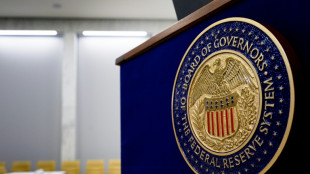
-
 'Soap opera on cocaine': how vertical dramas flipped Hollywood
'Soap opera on cocaine': how vertical dramas flipped Hollywood
-
Under pressure? EU states on edge over migrant burden-sharing
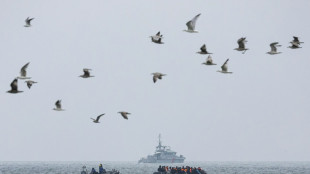
-
 US influencers falsely associate Mamdani with extremist group
US influencers falsely associate Mamdani with extremist group
-
Hungary's Orban to meet Trump in face of Russia oil sanctions
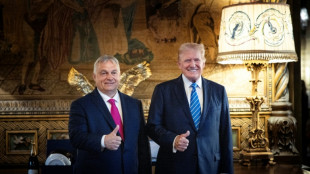
-
 US facing travel chaos as flights cut due to govt shutdown
US facing travel chaos as flights cut due to govt shutdown
-
Liverpool and Man City renew rivalry as they try to narrow Arsenal gap

-
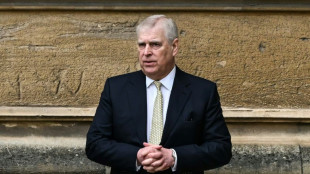 UK's Andrew asked to testify over Epstein as he formally loses titles
UK's Andrew asked to testify over Epstein as he formally loses titles
-
Local hero: 'DC sandwich guy' found not guilty of assaulting officer with sub

-
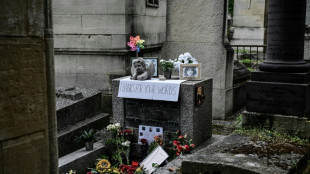 Dead famous: Paris puts heritage graves up for grabs
Dead famous: Paris puts heritage graves up for grabs
-
UK grandmother on Indonesia death row flies home
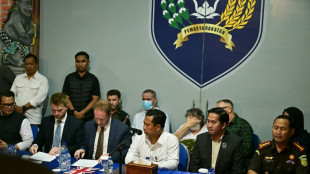
-
 Former NFL star Brown extradited from Dubai to face trial in shooting - police
Former NFL star Brown extradited from Dubai to face trial in shooting - police
-
Chile presidential hopeful vows to expel 'criminal' migrants to El Salvador

-
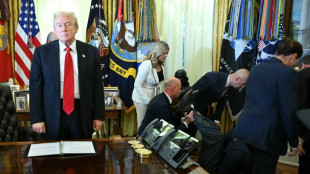 Trump event paused in Oval Office when guest faints
Trump event paused in Oval Office when guest faints
-
NFL Colts add Sauce to recipe while Patriots confront Baker


Digital voting breeds distrust among overseas Filipino workers
A new online voting system aimed at boosting turnout among the Philippines' millions of overseas workers ahead of Monday's mid-term elections has been marked by confusion and fears of disenfranchisement.
Thousands of overseas Filipino workers, or OFWs, have already cast their ballots in the race dominated by a bitter feud between President Ferdinand Marcos and his impeached vice president Sara Duterte.
While official turnout figures are not yet publicly available, data from the Commission on Elections (Comelec) show at least 134,000 of the 1.22 million registered overseas voters have signed up for the new online system, which opened April 13.
But Jun Burlasa III, a Filipino working in Singapore, says he will not vote again if he has to do it online.
"I'd rather do manual," the 50-year-old told AFP this week, describing the new system as "confusing and suspicious".
At issue is a digital QR code generated after voting that leads users to a page asking them to verify their ballot has been submitted correctly. Below that is a box containing a jumble of computer code and candidate names.
Burlasa said many of the names visible were candidates for whom he had not voted.
Similar stories about the anxiety-inducing webpage have proliferated across social media, including Facebook posts that have reached thousands.
Eman Villanueva, a Hong Kong-based activist with migrant rights group BAYAN, said he was unsure his vote had been properly counted.
"There is absolutely no way for the voters to know if the votes that went through really reflected our choices," he said.
In previous overseas elections, voters could review the names they selected after the fact, but Comelec told AFP the QR code was never supposed to serve that purpose.
The landing page was only intended to verify a ballot's receipt, the commission said, adding that the name of every candidate running in the election should appear.
"We are definitely considering the feedback and studying how to incorporate them in future elections," Ian Geonanga, Comelec's director of overseas voting, told AFP.
Election watchdogs, however, say the commission failed to properly explain the new system and warn of the confusion risks disenfranchising voters.
"It's a natural reaction of people that if you're not familiar with the system, then you won't trust it the first instance," said Ona Caritos, executive director of the nonprofit Legal Network for Truthful Elections (Lente).
- ChatGPT, disinfo and 2028 -
Since April 14, 1.5 million people have watched a video in which a Philippines-based engineer named Jaydee San Juan quizzes ChatGPT about the names visible on the ballot verification page.
"It's highly likely showing the candidates that were selected/voted for using that ballot ID," the AI chatbot replied.
Comelec, however, got the opposite answer when conducting the ChatGPT experiment itself, Geonanga told AFP.
The election commission's efforts to quell fears about the new system, meanwhile, have been misrepresented to sow more disinformation.
AFP fact-checkers recently debunked a video edited to make it appear Geonanga was saying online ballots were "designed" to rig the election's results.
The fiasco has also left election watchdogs and migrant groups sceptical that the switch to online voting will boost turnout as intended.
Danilo Arao, convenor of voting watchdog Kontra Daya, said even a small change to the ballot's design might have helped assuage fears he believes could lead to "widespread disenfranchisement".
Lente's Caritos said losing trust in the online voting system could impact OFWs' participation in the 2028 presidential election.
“We don't want that, because if election results are not trusted by our voters, then it would go into the legitimacy of the government," she said. "It's a domino effect."
T.Ziegler--VB


